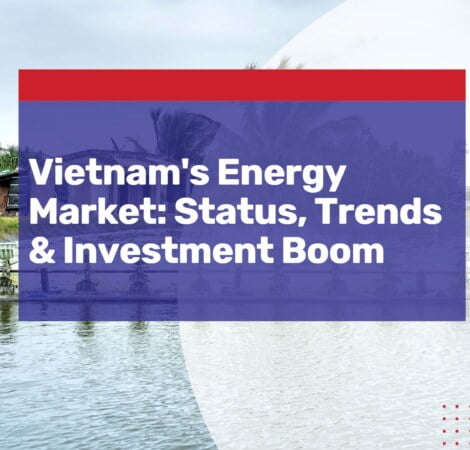Vietnam is one of the fastest-growing economies in Southeast Asia, with a large population nearing 100 million and a strong demand for electricity. The country’s energy sector is undergoing a transformation to diversify its energy sources, reduce its dependence on coal, and increase its use of renewable energy. This transformation offers significant opportunities for investors, entrepreneurs, and energy service companies who can provide innovative and sustainable solutions for Vietnam’s energy challenges.
This article explores the current state and future outlook of Vietnam’s energy market, the policies and incentives that support the development of clean energy, and the potential areas for business collaboration and investment in this dynamic and evolving sector.
Vietnam Energy Market Overview
Vietnam’s energy market has earned a spot on the world’s top smart grid index (SGI) with Ho Chi Minh City Power Corporation (EVNHCMC)’s score of 71.4 in the 2022 SGI compiled by Singapore’s SP Group. EVNHCMC ranked 47th out of 94 power companies from 39 countries worldwide. In Southeast Asia, EVNHCMC was placed second, behind SP Group. The smart grid index evaluates companies based on seven dimensions:
- Renewable energy
- Data analytics
- Supervising and control
- Supply chain reliability
- Integration of distributed energy resources
- Security
- Customer satisfaction
Vietnam’s energy balance is largely dominated by its total consumption of 143.20 billion kWh of electric energy per year, with an average of 1,469 kWh per capita. The country has the potential to be self-sufficient in terms of energy production, as the total production of all-electric energy-producing facilities is 158 billion kWh, 110% over the country’s usage. However, Vietnam still engages in energy trading with foreign countries. The production, imports, and exports of energy are crucial factors in the energy balance, in addition to using other energy sources like natural gas and crude oil.
Main Sources of Energy in Vietnam
According to Our World in Data, Vietnam has undergone significant changes in its sources of electricity over the past 5-10 years. Here is a breakdown of the changes in the energy sources:
Coal consumption
Coal remains the largest source of electricity in Vietnam. Its share of electricity generation was over 17.3% in 2010 and increased to around 46.62% in 2021
Hydropower consumption
Hydropower has been a significant source of electricity in Vietnam for many years, and its share of electricity generation has remained relatively stable over the last decade. Its share of electricity generation was around 14.66% in 2010 and increased slightly to 16.55% in 2021.
Gas consumption
Natural gas has seen a significant increase in its share of electricity generation in Vietnam over the last decade. Its share of electricity generation was around 16.79% in 2010 and decreased to around 5.94% in 2021.
Solar consumption
Solar power has seen rapid growth in Vietnam over the last decade. The share of electricity generation has risen from less than 1% in 2010 to around 5.62% in 2021.
Oil consumption
Oil is not a significant source of electricity generation in Vietnam. Its share of electricity generation has remained less than 1% over the last decade.
Geo-biomass consumption
Geo-biomass, which refers to the use of geothermal energy and biomass for electricity generation, is not a significant source of electricity in Vietnam. The data shows that its share of electricity generation has remained less than 1% over the last decade.
Wind consumption
Wind power is a relatively new source of electricity in Vietnam and has seen marginal growth in recent years. The share of electricity generation has risen from less than 0.02% in 2010 to around 0.5% in 2020.
Biofuels consumption
Biofuels, such as ethanol and biodiesel, are not widely used for electricity generation in Vietnam. Their contribution to the country’s electricity generation is negligible.
RELATED: Quick Shift Away From Coal, Vietnam’s Boom in Renewable Energy
Opportunities for Foreign Investors in the Energy Sector

Vietnam’s prime minister made a commitment to attain carbon neutrality by 2050 during the UNFCCC (United Nations Framework on Climate Change Conference) in November 2021. To reach this goal, sustainable energy sources need to account for at least 70% of the electricity consumption in Vietnam’s electricity system by 2050, according to the Vietnam Energy Outlook Report 2022.
In order to achieve this target, the government has implemented a range of regulations and incentives. Tax breaks, reduced corporate income tax (CIT) rates, exemption of import tax, lower land rent, and financing support are provided to encourage investment in this sector.
- Vietnam’s new foreign investment negative list includes 59 industries permitted for foreign investment, some under certain conditions. In this list, solar and wind power projects are listed as sectors encouraging foreign investment. Hydro, nuclear, and offshore wind power, however, are labelled conditional access.
- Corporations investing in renewable energy projects can benefit from a preferential CIT rate of 10%, while the standard rate is 20%. This preferential rate is available for a period of 15 years from the first year with income, which can be extended up to 30 years in certain exceptional circumstances with the approval of the prime minister.
- No import tariffs are levied on materials for renewable energy infrastructure.
- The duration of land rent exemption depends on the project’s location, ranging from 3 to 15 years or the entire investment period (not applicable if the project site is rent-free).
- Project companies can obtain a loan of up to 70% of the complete investment amount from the Vietnam Development Bank (VDB). However, the limited funds available from the VDB have made it challenging to make use of this incentive.
- Investors are also protected in terms of investment stability. If regulations change in a favorable manner, investors can benefit from the new policies for the rest of the project. However, if the new policies are less favorable, investors can still retain their previous benefits, as long as they have secured an investment registration certificate, investment certificate, or in-principal approval document.
Legal Requirements for Energy Companies
To tap into the rapidly burgeoning Vietnam’s energy market, you can establish a company by obtaining a license for electricity generation. The license types required will depend on the nature of the business activities.
The licenses include the following:
- License for Electricity consultancy (validity of 5 years)
- License for Electricity generation (validity of 10-20 years)
- License for Electricity transmission (validity of 20 years)
- License for Electricity distribution (validity of 10 years)
- License for Electricity wholesale (validity of 10 years)
To obtain the required licenses for setting up an energy company in Vietnam, the following conditions must be met:
- Construction of the power station should adhere to approved power development planning (installation, commissioning construction, and testing activities).
- The personnel involved in technical focussed activities must meet specific qualifications: a university degree in electricity, at least 5 years of experience in electricity generation, and relevant specialized sector training, safety training, and a certificate for operating a power plant.
- Your company should have a comprehensive IT infrastructure system, and a data collection, management, and supervision system.
- The equipment must comply with strict labor safety requirements and meet the technical specifications.
- Environmental impact assessment reports and environmental protection commitment reports must be available for approved projects.
- Your power plant must have tested and approved fire prevention and fighting systems.
- Your business must have the authorized operational procedure of the hydropower plant’s reservoir.
- Legal paperwork concerning hydroelectric power stations and reservoirs is necessary.
For the detailed process of setting up a company in Vietnam, see our comprehensive guide.
About Us
InCorp Vietnam is a leading provider of global market entry services. We are part of InCorp group, a regional leader in corporate solutions, that encompasses 8 countries in Asia-Pacific, headquartered in Singapore. With over 1,100 legal experts serving over 15,000 Corporate Clients across the region, our expertise speaks for itself. We provide transparent legal consulting, setup, and advice based on local requirements to make your business perfectly fit into the market with healthy growth.
Don’t take our word for it. Read some reviews from some of our clients.
